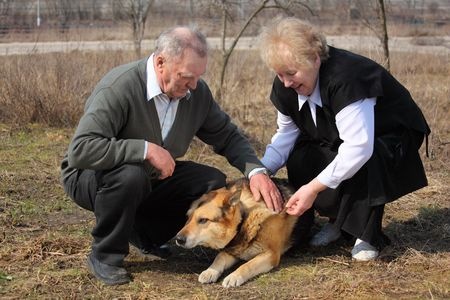 Chemotherapy is the general name for conventional drug treatments that seek to poison the rapidly growing malignant cancer cells, while at the same time causing the least amount of harm to the other healthy cells in the patient’s body.
Chemotherapy is the general name for conventional drug treatments that seek to poison the rapidly growing malignant cancer cells, while at the same time causing the least amount of harm to the other healthy cells in the patient’s body.
Because of the systemic nature of Canine Lymphoma (with cancer cells generally spread throughout the patient’s body), chemotherapy is generally viewed as among the best Canine Lymphoma Treatment Options…
Of course, more potent Canine Lymphoma Chemotherapy treatments will kill more cancer cells, but there needs to be a balance between what the patient can tolerate and what will work to fight the cancer.
That’s why it’s important to work with a veterinary expert if you decide to choose chemotherapy as your dog’s Canine Lymphoma treatment option. Because coming up with the proper balance will be critical to helping your dog get and stay healthy for as long as possible.
Canine Lymphoma Chemotherapy Protocols
Because of how common Canine Lymphoma is in dogs, vets have a substantial amount of experience and have tested many different combinations of chemotherapy treatments for Canine Lymphoma care (often in combination with other conventional treatments as well), and have come up with a variety of “protocols” that have been discovered to work well in these cases.
Many of these protocols are discussed in greater detail on other pages of this website, and include:
- The Madison Wisconsin Protocol
- Vincristine/Cytoxan
- Lomustine/CCNU
- Other Miscellaneous Rescue Protocols
Of all the chemotherapy drugs and treatment protocols available to treat Canine Lymphoma, the treatments that have the best statistical results, in terms of the percentage of dogs who enter remission, the period of time those dogs stay in remission, and the longest overall survival times involve protocols (such as the “Madison Wisconsin Protocol“) generally combine more than one chemotherapy drug given over several weeks or months – although there are approaches that involve administration of a single drug that can be somewhat effective as well.
Throughout the treatments, your vet will monitor the response of your dog to the treatments, to determine response to therapy, toxicity of the treatment, side effects of Lymphoma Chemotherapy, etc.
Canine Lymphoma Chemotherapy: Remission vs. Cure
In the cases of Canine Lymphoma chemotherapy treatments, the focus is primarily on “remission” of the disease, and not actual cure. This is different from many of the chemotherapy treatments used on human patients.
There are several reasons for this…
- Lower doses of the chemotherapy drugs are generally used on dogs to minimize the potential for side effects
- And given the significantly shorter lifespan of dogs compared to humans, putting dogs through the struggles of more severe treatment protocols seem unfair given the limited lifespan available, despite the possible curative effect of those more severe treatments.
- Etc
 For these reasons, while you can generally expect positive results (remission with a minimal amount of side effects) from chemotherapy for Canine Lymphoma care, unfortunately you should not expect any of the existing Canine Lymphoma chemotherapy treatment protocols to cure the disease.
For these reasons, while you can generally expect positive results (remission with a minimal amount of side effects) from chemotherapy for Canine Lymphoma care, unfortunately you should not expect any of the existing Canine Lymphoma chemotherapy treatment protocols to cure the disease.
Note: By definition, “remission” is a period where the patient feels well and where there is no physical evidence of cancer in the patient. In reality, most vets believe that the disease is always still there, but in small levels and so hidden away that we can’t necessarily detect whether the disease is active. That’s why vets say that their goal is to get the cancer to a clinically non-detectable state.
For more information, this website also has valuable information about Canine Lymphoma Chemotherapy
- Previous Article – Canine Lymphoma Treatment Cost
- Next Article – Chemotherapy: The Madison Wisconsin Protocol
———————
For more free Canine Lymphoma information, downloads and support - and
for help with your dog’s cancer care – visit our sister Charity website
"The Dog Cancer Tribe" at www.DogCancerTribe.com
Note: The information on this website is intended for research and informational purposes only. It is not to be used to diagnose or treat any disease, and should not be used as a substitute for proper veterinary consultation and care. Every dog and every cancer case is different, so if you fear that your dog has Canine Lymphoma, we encourage you to seek appropriate professional veterinary care as quickly as possible to determine the best course of action to treat your dog and his or her particular circumstances.
———————
(c) 2021 - CanineLymphoma.com Privacy Policy | Terms and Conditions | Sitemap






